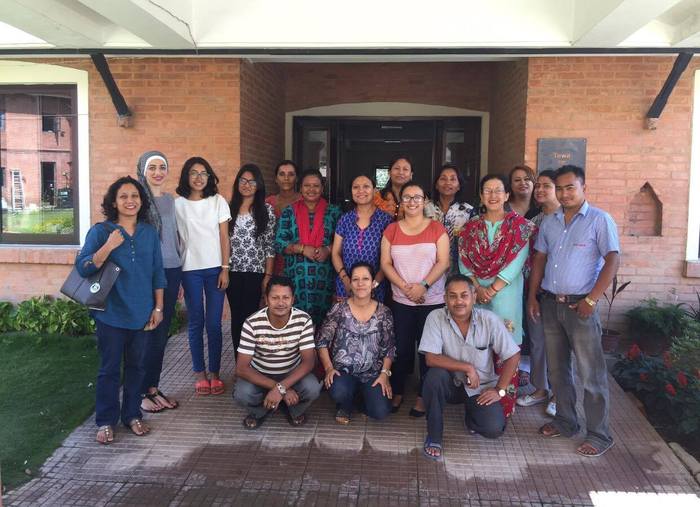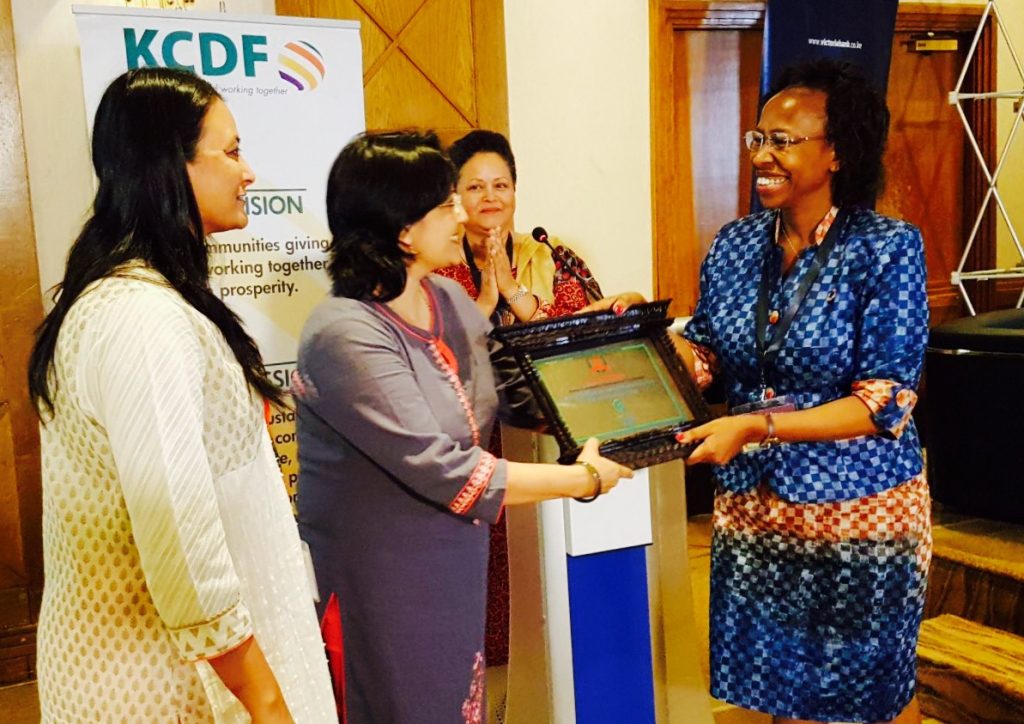From Palestine to Nepal: linking the learning to #ShiftThePower
08 Sep 2017

Ahlam (2nd L) meets with new friends at Tewa
Back in December 2016, the Global Summit on Community Philanthropy in Johannesburg, South Africa, brought people together from all over the world to explore how to shift the fields of development and philanthropy towards a new paradigm of “people based development.” The rallying cry for the Summit was #ShiftThePower which, as a hashtag on Twitter, continues to keep the conversation alive, across countries, regions and issues. As importantly, however, the Summit marked the beginning of new connections, conversations and friendships among organizations eager to share their experiences and learn from each other.
In July, Ahlam Samarah of Palestine’s Dalia Association in Palestine, headed to Nepal to find out about the work of Tewa-the Nepal Women’s Fund, particularly in the areas of local fundraising (a cornerstone of the Tewa model) and women’s empowerment. The visit proved to be a rich learning experience for both the team in Kathmandu and Ahlam. Below, they share impressions, takeaways and lessons.
What did the Dalia Association learn from the visit to Tewa?
GFCF: Can you give us a little background about the work you do at the Dalia Association and the type of communities you work with?
Ahlam Samarah: The Dalia Association was established to promote and facilitate community-led development and to raise awareness about the value of local resources and the abundance of resources available in Palestinian communities in Palestine, as well as in the diaspora. The key is linking resources available with the priorities identified locally. Development is a human right, and Dalia firmly believes that Palestinian communities have a right to direct their development. We also believe that the Palestinian community is anxious to support self-determination in development. Our main activities are in the areas of: philanthropy; Village Decides; Women Supporting Women; youth; and, advocacy.
GFCF: What did you learn during your time with Tewa? What is different and what is similar to the work that the Dalia Association does?
AS: It was an enriching experience! I learned a lot about Tewa’s work, specifically how they manage: programmes, grants, HR, volunteers, community philanthropy, local fundraising, and donors. At Dalia, we work directly with local communities in a process whereby they determine and voice their priorities – based on that, they then decide how grant funds will be allocated through an open voting process. Whereas at Tewa, they work with registered women’s organizations and then it is an internal committee from Tewa that guides the grant selection process. Despite the differences in process, the ultimate goal of our organizations is the same: to reduce dependency on foreign donors, and to create a sustainable model of development that is owned by the local community.
GFCF: Do you think this kind of peer learning is useful? Why do you think these types of networks and relationships are important in community philanthropy?
AS: Of course, it’s very important to learn from others, especially those who are from different cultures, because that gives new ways of thinking, and different perspectives on similar issues. Moreover, it’s a good way to gain practical skills. And fostering these types of relationships is particularly important in our field, because when communities engage with each other, especially to address gaps they see that need to be filled, they can achieve deep-rooted development outcomes. Learning from each other can also improve the quality of giving that is happening, and the same time innovating new ways of giving.
What did Tewa learn from the visit of the Dalia Association?
GFCF: What was your experience in hosting someone from a Palestinian community foundation?
Urmila Shrestha, Roshani Thapa & Shreejana Thapa Pathak: Hosting someone from Palestine was a new experience for us. Before welcoming Ahlam to Tewa, we had a Skype briefing with Aisha, the Director of the Dalia Association, in particular to share more background on the visit and what they hoped to achieve. It allowed us to understand the objectives of Ahlam’s visit, and how best to use the time available to help her learn how we work. Each of the different departments prepared accordingly – we hope the team did a great job in hosting our guest!
GFCF: What did you learn from the experience? And how did you think it was valuable to your work?
US, RT & STP: During the conversations with Ahlam, we were able learn new things about Palestine. We learnt about the culture, tradition, working environment, status of women, the literacy rate of women, about feminist leaders, volunteerism in Palestine and many more aspects about their way of life. Apart from the more personal side of things, we exchanged experiences about how our organizations work to accomplish our goals in the very different contexts where we operate. We learnt how their organization sees community philanthropy and how they support local fundraising. Since understanding locally driven fundraising was an important part of Ahlam’s visit, we tried to share as much as we could about how we approach it in Nepal, specifically building long-term commitment from our donors.
GFCF: Do you think this kind of peer learning is useful? Why do you think these types of networks and relationships are important in community philanthropy?
US, RT & STP: Yes, there is no doubt that this type of peer learning between organizations is very valuable – whether that involves organizations based in the same country, or organizations from different countries. These types of networks really help to clarify the concept of how we work with communities, and illustrates concrete ways that we can improve our efforts. Hearing about similar work in a completely different context was nothing short of inspiring. Such an exchange allowed us to build a solid relationship between our two organizations, and we hope that we can continue to work together in the long-run, to continue growing the global field of community philanthropy. We plan on continuing to be “resource people” to each other, to exchange knowledge and skills, as well as in an effort to help strengthen feminist leadership.

Tewa staff & board offer KCDF a 20th birthday gift
GFCF: Staff and board from Tewa also attended the 20th anniversary conference of the Kenya Community Development Foundation in June in Nairobi. What were the main learnings from that event?
US, RT & STP: Participating at the KCDF 20th anniversary conference was an opportunity to meet with 200+ development practitioners for two days of power-packed and intense dialogue. The main theme of the conference was “Durable Development, Shifting the Power, Building Community Resilience”: it was a great motivational programme.
The conference also proved to be a good platform to introduce and highlight the work of Tewa in Nepal, as we got the opportunity to share experiences and how we sustain our work. We also got to learn about progress made in terms of philanthropic practices, especially with regards to partnering with the corporate sector. Group sessions on durable development that focused on: processes to empower communities; creating local wealth; and, building community resilience, were all particularly interesting and relevant for us.
Likewise, the need for shifting power to the grassroots by providing people agency to decide and to act on their own, is a concept that we liked hearing more about – how is this happening in practice? Also, rather than limiting the understanding of philanthropy to “raising funds” to do the work, the conference provided additional perspective around how it can be a “one-dimensional tool to secure money in order to do the real work.” And, of course, our time in Nairobi also provided us with the opportunity to be exposed to African culture and society, which was an interesting experience for us, coming from a different cultural and social background in Asia.
Overall, we feel that Tewa possesses a similar vision and mission to many of the civil society organizations that we met in Nairobi. We still took a lot of ideas home with us, on how to continue advancing the broader practice of philanthropy in Nepal. We now feel strengthened and equipped to better incorporate “durable development” and “shifting the power” into our day-to-day work!

